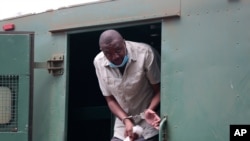Zimbabwean journalist Hopewell Chin'ono was denied bail Thursday after being arrested for the second time year. Chin’ono is facing charges of “abusing” social media. The charge has triggered an outcry from local and international press freedom watchdogs who accuse Zimbabwe’s government of trying to stifle critical voices.
Journalist Hopewell Chin’ono was arrested on November 3 on charges of “abusing” social media to obstruct justice.
David Coltart is one of members of Zimbabwe Lawyers for Human Rights representing him. He talked to media Thursday after his client was denied bail at the Magistrates Court.
“From our perspective, it is clear that he is being targeted for his journalism. That was made very clear in these charges, that it is about his journalism and his sources reporting on corruption. He has been fearlessly reporting on corruption issues and that is really what this is about,” he said.
Chin’ono was arrested after he posted on Twitter a message saying “corrupt” allies of President Emmerson Mnangagwa are arrested and immediately bailed while innocent citizens remain in custody.
This is the second time that Chin’ono has been arrested this year. After his arrest in July - on accusations of supporting an anti-government protest on social media - he spent nearly six weeks in prison before being released on bail in September pending trial.
The head of Human Rights Watch in Southern Africa, Dewa Mavhinga, said his organization is worried by Chin’ono’s second arrest.
“It is not just about seeking to break Hopewell’s spirit, but it is also about sending a warning, to strike fear in the hearts of all journalists that they cannot challenge high level state corruption. As Human Rights Watch we are extremely concerned that Zimbabwean authorities are going and continuing on this path of repression. Tweeting is not a crime. Zimbabwe is quickly ceiling its position as a pariah state because of its heavy handiness responses to activists and journalists like Hopewell Chin’ono,” he said.
Zimbabwe’s information minister Monica Mutsvangwa said she would not comment on the issue as the cabinet had not discussed it.
Tabani Moyo from Media Institute of Southern Africa said the crackdown on citizens speaking out on social media is not confined to Zimbabwe.
“In August, Southern Africa Development Community heads of state and government, meeting in Maputo took a decision that they must increase surveillance of online media use and targeting of those that are disseminating views on social media. So this is not an isolated move by the Harare administration but it’s a trend we are seeing which is on the increase in the region,” said Moyo.
Meanwhile, Chin’ono’s trial for his first charges is expected to start in early December.










Facebook Forum